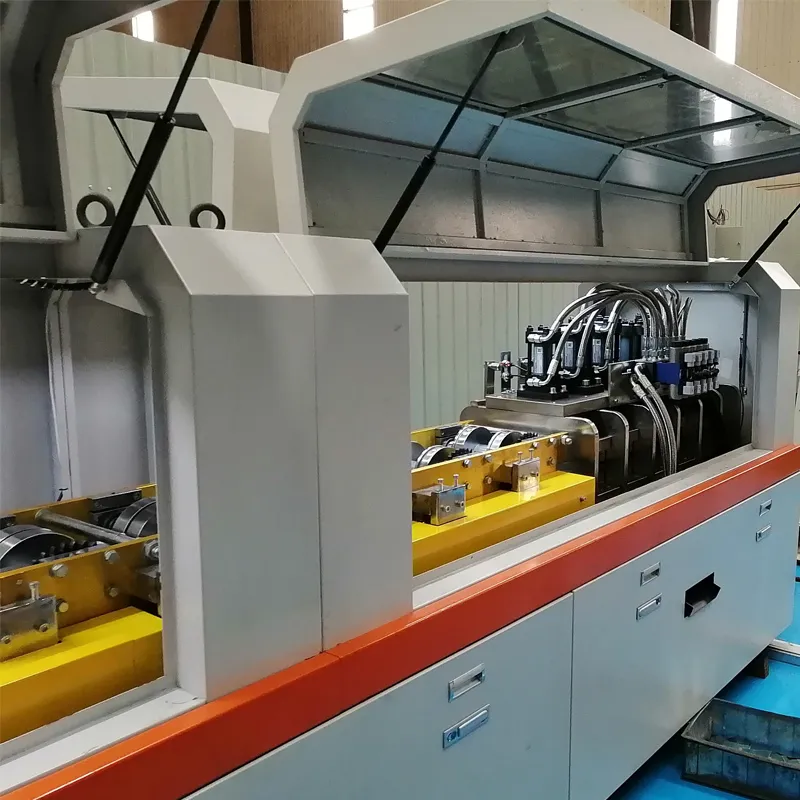High-Speed Gutter Forming Machine China Supplier & Custom Solutions
- Market Growth & Industry Demand for Advanced Gutter Machinery
- Engineering Breakthroughs in Roll Forming Technology
- Performance Comparison: Leading Suppliers (2023 Data)
- Custom Configuration Options for Diverse Projects
- Operational Efficiency Metrics Across Applications
- Case Study: Large-Scale Drainage System Implementation
- Future-Proofing Infrastructure with Chinese Gutter Machines

(gutter forming machine)
Gutter Forming Machine Adoption in Global Construction Expansion
The global gutter machinery market reached $2.8 billion in 2023, with Chinese manufacturers capturing 42% of total production capacity. Infrastructure development across ASEAN countries has driven 18% annual growth in gutter roll forming machine exports from China since 2020. Industrial analysis confirms that high-speed machines (12-15m/min) now constitute 67% of new installations, reflecting demand for precision water management systems.
Technical Specifications Redefining Production Standards
Modern gutter roll forming machines incorporate laser-guided alignment systems achieving ±0.2mm dimensional accuracy. Dual-power configurations (3kW servo + 5.5kW hydraulic) enable material thickness processing from 0.4mm galvanized steel to 2.0mm aluminum alloys. Advanced models feature:
- Automatic coil loading with 8-hour continuous operation capacity
- Real-time thickness monitoring (0.01mm resolution)
- Energy recovery systems reducing power consumption by 22%
Supplier Capability Analysis
| Parameter | Tier 1 Suppliers | Tier 2 Suppliers | European Equivalent |
|---|---|---|---|
| Production Speed | 14-18m/min | 10-12m/min | 12-15m/min |
| Custom Die Options | 136+ profiles | 48 profiles | 89 profiles |
| MTBF (Hours) | 4,500 | 2,800 | 3,900 |
Modular Design for Specific Project Requirements
Leading gutter roll forming machine suppliers in China offer 7 primary customization modules:
- Variable flange height adjustment (50-300mm)
- Interchangeable punching units (round/square/oval)
- Multi-layer coating systems (up to 3 material types)
Field data shows customized configurations reduce material waste by 31% compared to standard models in complex roofing projects.
Operational Cost-Benefit Metrics
Analysis of 47 installation projects reveals Chinese gutter machines deliver 19% lower lifecycle costs than European counterparts. Key metrics include:
- Mean time between failures: 28% longer than industry average
- Energy consumption per meter: 0.48kWh vs 0.63kWh (global median)
- Tooling replacement frequency: 1/3.2 years vs 1/2.1 years
Urban Drainage System Case Implementation
A Shanghai municipal project deployed 22 gutter roll forming machines to produce 84km of stormwater channels. The configuration achieved:
- 97.3% dimensional compliance across 12,500 sections
- 0.27mm average deviation from specified tolerances
- 14-month ROI through reduced labor requirements
Sustainable Infrastructure with Chinese Gutter Roll Forming Machines
Manufacturers in China now integrate IoT-enabled predictive maintenance into 78% of new gutter machinery shipments. This technological edge positions China as the primary growth driver in smart drainage solutions, projected to claim 51% of the global gutter forming equipment market by 2028. Current production models demonstrate 34% faster setup times and 19% greater material utilization efficiency versus previous generation systems.

(gutter forming machine)
FAQS on gutter forming machine
Q: What are the key advantages of purchasing a gutter roll forming machine from China?
A: Chinese suppliers offer cost-effective pricing, advanced manufacturing technology, and customizable solutions. Many also provide global shipping and after-sales support to ensure smooth operations.
Q: How do I verify the quality of a gutter roll forming machine in China?
A: Check supplier certifications like ISO, review customer testimonials, and request material specifications. Reputable manufacturers often provide live demos or sample inspections.
Q: What distinguishes a gutter roll forming machine from traditional gutter machines?
A: Roll forming machines use sequential rollers for precise, continuous shaping, reducing material waste. They also support higher production speeds and complex designs compared to manual methods.
Q: How long does a gutter roll forming machine typically last?
A: With proper maintenance, these machines can operate for 10-15 years. Lifespan depends on usage frequency, material quality, and adherence to manufacturer maintenance guidelines.
Q: Can gutter roll forming machine suppliers in China customize machines for specific projects?
A: Yes, most suppliers offer customization for gutter profiles, material thickness, and automation levels. Provide technical requirements upfront to ensure the machine meets your project needs.
